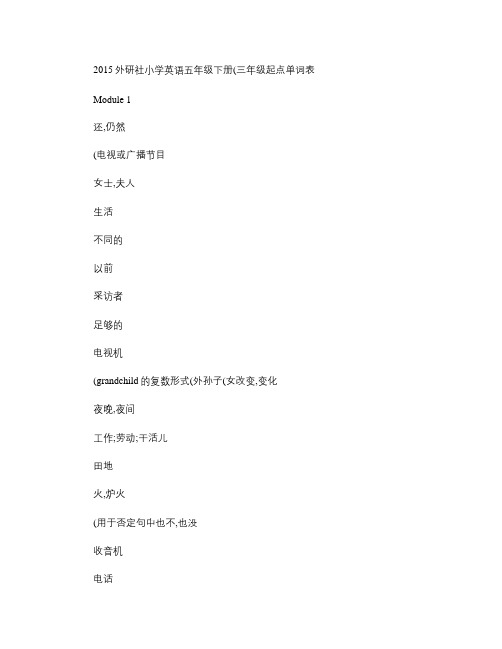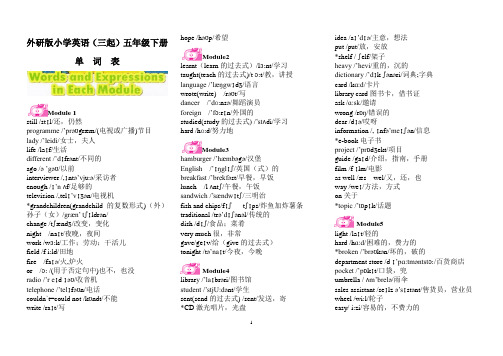外研三起五年级下册课文单词翻译2
外研社小学五年级下册英语单词汉译英(精)

2015外研社小学英语五年级下册(三年级起点单词表Module 1还,仍然(电视或广播节目女士,夫人生活不同的以前采访者足够的电视机(grandchild的复数形式(外孙子(女改变,变化夜晚,夜间工作;劳动;干活儿田地火,炉火(用于否定句中也不,也没收音机电话不能写希望Module 2(learn的过去式学习(teach的过去式教,讲授语言(write写舞蹈演员外国的(study的过去式学习努力地Module 3汉堡英国(式的早餐,早饭午餐,午饭三明治炸鱼加炸薯条传统的食品;菜肴很,非常(give的过去式给今夜,今晚图书馆学生(send的过去式发送,寄激光唱片,光盘主意,想法放,安放架子重的,沉的词典;字典卡片图书卡,借书证邀请错误的哎呀信息电子书项目介绍,指南,手册电影又,还,也方法,方式关于话题轻的困难的,费力的坏的,破的百货商店口袋,兜雨伞售货员,营业员轮子容易的,不费力的选择要,选择购买太,过于试,尝试美丽的,可爱的;令人愉快的Module 6 月亮,月球到达西,西部,西方;向西方母亲;父亲;家长停留七月南,南部,南方;向南方记得六月东,东部,东方;向东方最好的北,北部,北方;向北方休息休息一下(ride的过去式骑傍晚,晚上近日暮的;近深夜的;时间不早的工人制造厂;工厂早的出租车,计程车一刻钟(距整点差......焦虑,担心Module 8纸中国人的如此,这样词,字(draw的过去式画(cut的过去式剪,切,割张,片,块(用颜料绘画,着色(put的过去式放,安放小木棍,小木条(tie的过去式扎上,系上线,绳子笑(wear的过去式穿信,书信剧院(woman的复数形式女性,妇女演员(tell的过去式口述,讲(故事等笑话在……以后(尤指剧院的演出,表演饭店,餐馆(read的过去式读一点都在(将来一段时间之后另一个历史问,询问问题忘,忘记带来,拿来不久,很快Module 10在什么时候结束,终止紧张的,情绪不安的没事,没问题机场票护照安全的,平安的宠物说,建筑物美国的;美国人的;美国人发现,弄清更多的(量,较多的(量。
外研版小学英语三起五年级下册单词表含音标

外研版小学英语三起五年级下册单词表含音标The Standardization Office was revised on the afternoon of December 13, 2020外研版小学英语(三起)五年级下册单词表Module 1still /stɪl/还,仍然programme /’prəʊgræm/(电视或广播)节目lady /’leidi/女士,夫人life /laɪf/生活different /’dɪfrənt/不同的ago /ə’gəʊ/以前interviewer /,ɪntə’vj u:ə/采访者enough /ɪ’n ʌf/足够的television /,telɪ’vɪʒən/电视机*grandchildren(grandchild的复数形式)(外)孙子(女)/græn’ tʃɪldrən/ change /tʃændʒ/改变,变化night /naɪt/夜晚,夜间work /wɜ:k/工作;劳动;干活儿field /f i:ld/田地fire /faɪə/火,炉火or /ɔ: /(用于否定句中)也不,也没radio /’r eɪd ɪəʊ/收音机telephone /’telɪfəʊn/电话couldn`t=could not /kʊndt/不能write /raɪt/写hope /həʊp/希望Module2learnt(learn的过去式)/lɜ:nt/学习taught(teach的过去式)/t ɔ:t/教,讲授language /’læŋgwɪdʒ/语言wrote(write) /rəʊt/写dancer /’dɑ:nsə/舞蹈演员foreign /’fɔ:rɪn/外国的studied(study的过去式) /’stʌdi/学习hard /hɑ:d/努力地Module3hamburger /’hæmbəgə/汉堡English /’ɪŋglɪʃ/英国(式)的breakfast /’brekfəst/早餐,早饭lunch /l ʌntʃ/午餐,午饭sandwich /’sændwɪtʃ/三明治fish and chips/fɪʃ tʃɪps/炸鱼加炸薯条traditional /trə’dɪʃənəl/传统的dish /dɪʃ/食品;菜肴very much很,非常gave/geɪv/给(give的过去式)tonight /tə’naɪt/今夜,今晚Module4library /’laɪbrəri/图书馆student /’stjU:dənt/学生sent(send的过去式) /sent/发送,寄*CD激光唱片,光盘idea /aɪ’dɪə/主意,想法put /put/放,安放*shelf / ʃelf/架子heavy /’hevi/重的,沉的dictionary /’dɪk ʃənəri/词典;字典card /kɑ:d/卡片library card图书卡,借书证ask /ɑ:sk/邀请wrong /rɒŋ/错误的dear /dɪə/哎呀information /, ɪnfə’meɪʃən/信息*e-book电子书project /’prɒdʒekt/项目guide /gaɪd/介绍,指南,手册film /f ɪlm/电影as well /æs wel/又,还,也way /weɪ/方法,方式on关于*topic /’tɒpɪk/话题Module5light /laɪt/轻的hard /hɑ:d/困难的,费力的*broken /’brəʊkən/坏的,破的department store /d ɪ’pɑ:tməntstɔ:/百货商店pocket /’pɒkɪt/口袋,兜umbrella / ʌm’brelə/雨伞sales assistant /seɪlz ə’sɪstənt/售货员,营业员wheel /wi:l/轮子easy/ i:zi/容易的,不费力的take /teɪk/选择要,选择购买too /tu:/太,过于try /traɪ/试,尝试lovely /’lʌvli/美丽的,可爱的;令人愉快的Module6moon /mu:n/月亮,月球get /get/到达west /west/西,西部,西方;向西方parent /peərənt/母亲;父亲;家长stay /steɪ/停留 play day sayJuly /dʒʊ’laɪ/七月south /saʊθ/南,南部,南方;向南方remember /rɪ’membə/记得June / dʒu:n/六月east / i:st/东,东部,东方;向东方best /best/最好的north /n ɔ:θ/北,北部,北方;向北方rest /rest/ 休息have a rest休息一下rode /rəʊd/骑(ride的过去式)Module7evening / ‘ɪvənɪŋ/傍晚,晚上late/l eɪt/近日暮的;近深夜的;时间不早的worker /’wɜ:kə/工人factory /’f æktəri/制造厂;工厂early /’ ɜ:li/早的taxi /’tæksɪ/出租车,计程车quarter /’kwɔ:tə/一刻钟to /tu:/(距整点)差......worry /’wʌri/焦虑,担心Module8paper /’peɪpə/纸Chinese / tʃaɪ’n i:z/中国人的so /səʊ/如此,这样word /w ɜ:d/词,字drew(draw的过去式) /dru:/画cut(cut的过去式) /k ʌt/剪,切,割piece /pi:s/张,片,块paint(用颜料)/peɪnt/绘画,着色put(put的过去式) /p ʊ t放,安放stick /stɪk/小木棍,小木条tied(tie的过去式)/taɪd/扎上,系上*string /strɪŋ/线,绳子Module9laugh /lɑ:f/笑wore(wear的过去式) /w ɔ:/穿letter /’letə/信,书信theatre /’θɪətə/剧院women(woman的复数形式)/’wɪmɪn/女性,妇女actor /’æktə/演员told(tell的过去式) /təʊld/口述,讲(故事等)joke / dʒəʊk/笑话after /’ ɑ:ftə/在……以后show(尤指剧院的) / ʃəʊ/演出,表演restaurant /’restərɒnt/饭店,餐馆read(read的过去式) /red/读at all一点都in在(将来一段时间)之后another /ən’ʌðə/另一个history /’hɪstəri/历史ask /ɑ:sk/问,询问question /’kwestʃən/问题forget /fə’get/忘,忘记bring /brɪŋ/带来,拿来soon /su:n/不久,很快Module10when /wen/在什么时候end /end/结束,终止nervous /’ nɜ:vəs/紧张的,情绪不安的all right没事,没问题ai rport /’ eəpɔ:t/机场ticket /’tɪkɪt/票passport /’pɑ:spɔ:t/护照safe /seɪf/安全的,平安的pet /pet/宠物speak/spi:k/说,讲building /’bɪldɪŋ/建筑物American/ ə’merɪkən/美国的;美国人的;美国人find out /faɪnd aʊt/发现,弄清more /mɔ:/更多的(量),较多的(量)。
外研社小学英语五年级下册(三年级起点)单词表((带音标)

外研版小学英语(三年级起点)五年级下册单词表Module 1still[stil]还,仍然Programme['prəugræm](电视或广播)节目lady['leidi]女士,夫人life[laif]生活different['difrənt]不同的ago[ə'gəu]以前Interviewer['intɚvjuɚ]采访者enough[i'nʌf]足够的television['teliviiʒ(ə)n]电视机*grandchildren['græn'tʃildrən](grandch ild的复数形式)(外)孙子(女)change[tʃendʒ]改变,变化night[nait]夜晚,夜间work[wɜ:k]工作;劳动;干活儿field[fi:ld]田地fire['faiə]火,炉火or[ɔ:](用于否定句中)也不,也没radio['reidiəu]收音机telephone['telifəun]电话couldn`t=could not不能write[rait]写hope[həup]希望Module 2learnt[lɜ:nt](learn的过去式)学习taught[tɔ:t](teach的过去式)教,讲授language['læŋgw idʒ]语言wrote[rəut](write)写dancer['dɑ:nsə(r)] 舞蹈演员foreign['fɔrən]外国的studied['stʌdid](study的过去式)学习hard[hɑ:d]努力地Module 3hamburger['hæmbɜ:gə(r)]汉堡English['iŋgliʃ]英国(式)的breakfast['brekfəst]早餐,早饭lunch[lʌntʃ]午餐,午饭sandwich['sænwitʃ]三明治fish and chips炸鱼加炸薯条traditional[trə'diʃənl]传统的dish[diʃ]食品;菜肴very much['veri mʌtʃ]很,非常gave[geiv](give的过去式)给tonight[tə'nait]今夜,今晚Module 4library['laibrəri]图书馆student['stju:dnt]学生sent[sent](send的过去式)发送,寄*CD 激光唱片,光盘idea[ai'diə]主意,想法put[put]放,安放*shelf[ʃelf]架子heavy['hevi]重的,沉的dictionary['dikʃənri]词典;字典card[kɑ:d]卡片library card图书卡,借书证ask[ɑ:sk]邀请wrong[rɔ:ŋ]错误的dear[diə(r)]哎呀information[ˌinfə'meiʃn]信息*e-book电子书project['prɔdʒekt][项目guide[gaid]介绍,指南,手册film[film]电影as well又,还,也way[wei]方法,方式on[ɔn]关于*topic['tɔpik]话题Module 5light[lait]轻的hard[hɑ:d]困难的,费力的*broken['brəukən]坏的,破的department store[di'pɑ:tmənt stɔ:]百货商店pocket['pɔkit]口袋,兜umbrella[ʌm'brelə]雨伞sales assistant[seilz ə'sistənt]]售货员,营业员wheel[wi:l]轮子easy['i:zi]容易的,不费力的take[teik]选择要,选择购买too[tu:]太,过于try[trai]试,尝试lovely['lʌvli]美丽的,可爱的;令人愉快的Module 6moon[mu:n]月亮,月球get[ɡet]到达west[west]西,西部,西方;向西方parent['peərənt]母亲;父亲;家长stay[stei]停留July[dʒu'lai]七月south[sauθ]南,南部,南方;向南方remember[ri'membə(r)]记得June[dʒu:n]六月east[i:st]东,东部,东方;向东方best[best]最好的north[nɔ:θ]北,北部,北方;向北方rest[rest]休息have a rest休息一下rode[rəud](ride的过去式)骑Module 7evening['i:vniŋ]傍晚,晚上late[leit]近日暮的;近深夜的;时间不早的worker['wɜ:kə(r)]工人factory['fæktri]制造厂;工厂early['ɜ:li]早的taxi['tæksi]出租车,计程车quarter['kwɔ:tə(r)]一刻钟to[tu,tə](距整点)差......worry['wʌri]焦虑,担心Module 8paper['peipə(r)]纸Chinese[ˌtʃai'ni:z]中国人的so[səʊ]如此,这样word[wɜ:d]词,字drew[dru:](draw[drɔ:]的过去式)画cut[kʌt](cut的过去式)剪,切,割piece[pi:s]张,片,块paint[peint](用颜料)绘画,着色put[put](put的过去式)放,安放stick[stik]小木棍,小木条tied[taid](tie的过去式)扎上,系上*string[striŋ]线,绳子Module 9laugh[lɑ:f]笑wore[wɔ:(r)](wear[weə(r)]的过去式)穿letter['letə(r)]信,书信theatre['θiətə]剧院women['wimin](woman['wumən]的复数形式)女性,妇女actor['æktə(r)]演员told[təuld](tell[tel]的过去式)口述,讲(故事等)joke[dʒəuk]笑话after['ɑ:ftə(r)]在……以后show[ʃəu](尤指剧院的)演出,表演restaurant['restrɔnt]饭店,餐馆read[ri:d](read的过去式)读at all[æt ɔ:l]一点都in[in]在(将来一段时间)之后another[ə'nʌðə(r)]另一个history['histri]历史ask[ɑ:sk]问,询问question['kwestʃən]问题forget[fə'get]忘,忘记bring[briŋ]带来,拿来soon[su:n]不久,很快Module 10when[wen]在什么时候end[end]结束,终止nervous['nɜ:vəs]紧张的,情绪不安的all right[ɔ:l rait]没事,没问题airport['eəpɔ:t]机场ticket['tikit]票passport['pɑ:spɔ:t]护照safe[seif]安全的,平安的pet[pet]宠物speak[spi:k]说,讲building['bildiŋ]建筑物American[ə'merikən]美国的;美国人的;美国人find out[faind aut]发现,弄清more[mɔ:(r)]更多的(量),较多的(量)。
(完整)外研版小学英语(三起)五年级下册单词表(含音标)(2)

外研版小学英语(三起)五年级下册单词表Module 1still /stɪl/还,仍然programme /’prəʊgræm/(电视或广播)节目lady /’leidi/女士,夫人life /laɪf/生活different /’dɪfrənt/不同的ago /ə’gəʊ/以前interviewer /,ɪntə’vj u:ə/采访者enough /ɪ’n ʌf/足够的television /,telɪ’vɪʒən/电视机*grandchildren(grandchild的复数形式)(外)孙子(女)/græn’ tʃɪldrən/change /tʃændʒ/改变,变化night /naɪt/夜晚,夜间work /wɜ:k/工作;劳动;干活儿field /f i:ld/田地fire /faɪə/火,炉火or /ɔ: /(用于否定句中)也不,也没radio /’r eɪd ɪəʊ/收音机telephone /’telɪfəʊn/电话couldn`t=could not /kʊndt/不能write /raɪt/写hope /həʊp/希望Module2learnt(learn的过去式)/lɜ:nt/学习taught(teach的过去式)/t ɔ:t/教,讲授language /’læŋgwɪdʒ/语言wrote(write) /rəʊt/写dancer /’dɑ:nsə/舞蹈演员foreign /’fɔ:rɪn/外国的studied(study的过去式) /’stʌdi/学习hard /hɑ:d/努力地Module3hamburger /’hæmbəgə/汉堡English /’ɪŋglɪʃ/英国(式)的breakfast /’brekfəst/早餐,早饭lunch /l ʌntʃ/午餐,午饭sandwich /’sændwɪtʃ/三明治fish and chips/fɪʃtʃɪps/炸鱼加炸薯条traditional /trə’dɪʃənəl/传统的dish /dɪʃ/食品;菜肴very much很,非常gave/geɪv/给(give的过去式)tonight /tə’naɪt/今夜,今晚Module4librar y /’laɪbrəri/图书馆student /’stjU:dənt/学生sent(send的过去式) /sent/发送,寄*CD激光唱片,光盘idea /aɪ’dɪə/主意,想法put /put/放,安放*shelf / ʃelf/架子heavy /’hevi/重的,沉的dictionary /’dɪk ʃənəri/词典;字典card /kɑ:d/卡片library card图书卡,借书证ask /ɑ:sk/邀请wrong /rɒŋ/错误的dear /dɪə/哎呀information /, ɪnfə’meɪʃən/信息*e-book电子书project /’prɒdʒekt/项目guide /gaɪd/介绍,指南,手册film /f ɪlm/电影as well /æs wel/又,还,也way /weɪ/方法,方式on关于*topic /’tɒpɪk/话题Module5light /laɪt/轻的hard /hɑ:d/困难的,费力的*broken /’brəʊkən/坏的,破的department store /d ɪ’pɑ:tməntstɔ:/百货商店pocket /’pɒkɪt/口袋,兜umbrella / ʌm’brelə/雨伞sales assistant /seɪlz ə’sɪstənt/售货员,营业员wheel /wi:l/轮子easy/ i:zi/容易的,不费力的take /teɪk/选择要,选择购买too /t u:/太,过于try /traɪ/试,尝试lovely /’lʌvli/美丽的,可爱的;令人愉快的Module6moon /m u:n/月亮,月球get /get/到达west /west/西,西部,西方;向西方parent /peərənt/母亲;父亲;家长stay /steɪ/停留play day sayJuly /dʒʊ’laɪ/七月south /saʊθ/南,南部,南方;向南方remember /rɪ’membə/记得June / dʒu:n/六月east / i:st/东,东部,东方;向东方best /best/最好的north /n ɔ:θ/北,北部,北方;向北方rest /rest/ 休息have a rest休息一下rode /rəʊd/骑(ride的过去式)Module7evening / ‘ɪvənɪŋ/傍晚,晚上late/l eɪt/近日暮的;近深夜的;时间不早的worker /’wɜ:kə/工人factory /’f æktəri/制造厂;工厂early /’ ɜ:li/早的taxi /’tæksɪ/出租车,计程车quarter /’kwɔ:tə/一刻钟to /t u:/(距整点)差......worry /’wʌri/焦虑,担心Module8paper /’peɪpə/纸Chinese / tʃaɪ’n i:z/中国人的so /səʊ/如此,这样word /w ɜ:d/词,字drew(draw的过去式) /dr u:/画cut(cut的过去式) /k ʌt/剪,切,割piece /pi:s/张,片,块paint(用颜料)/peɪnt/绘画,着色put(put的过去式) /p ʊ t放,安放stick /stɪk/小木棍,小木条tied(tie的过去式)/taɪd/扎上,系上*string /strɪŋ/线,绳子Module9laugh /lɑ:f/笑wore(wear的过去式) /w ɔ:/穿letter /’letə/信,书信theatre /’θɪətə/剧院women(woman的复数形式)/’wɪmɪn/女性,妇女actor /’æktə/演员told(tell的过去式) /təʊld/口述,讲(故事等)joke / dʒəʊk/笑话after /’ ɑ:ftə/在……以后show(尤指剧院的) / ʃəʊ/演出,表演restaurant /’restərɒnt/饭店,餐馆read(read的过去式) /red/读at all一点都in在(将来一段时间)之后another /ən’ʌðə/另一个history /’hɪstəri/历史ask /ɑ:sk/问,询问question /’kwestʃən/问题forget /fə’get/忘,忘记bring /brɪŋ/带来,拿来soon /s u:n/不久,很快Module10when /wen/在什么时候end /end/结束,终止nervous /’ nɜ:vəs/紧张的,情绪不安的all right没事,没问题airport /’ eəpɔ:t/机场ticket /’tɪkɪt/票passport /’pɑ:spɔ:t/护照safe /seɪf/安全的,平安的pet /pet/宠物speak/spi:k/说,讲building /’bɪldɪŋ/建筑物American/ ə’merɪkən/美国的;美国人的;美国人find out /faɪnd aʊt/发现,弄清more /mɔ:/更多的(量),较多的(量)。
外研版小学五年级英语下册课文翻译

Module1unit1part1thereare 有,后面跟可数名词复数看,椅子上有两只漂亮的猫咪。
现在只有一只。
好吧,(刚刚)有两只。
part2玲玲仍然与萨姆和埃米在英国。
看,玲玲!它是一个关于中国的节目。
快来看看! 我来了!许多年前,中国的生活(与现在)大不相同。
life 生活 复数是lives有什么不同呢?(那时)我们住在一座小房子里。
我们没有足够的食物。
没有很多公共汽车。
livein 住在 没有电视机。
现在怎么样呢?(现在)我们住在一座大房子里。
我们有许多食物。
有许多公共汽车和小汽车。
我每天看电视。
昨天我(还)与我的孙子孙女一起看电视了呢。
alotof=lotsof 谢谢你与我们谈话。
Thankyoufor+名词或动词ing 形式表示因为某事感谢别人。
中国正在变化着。
我想念中国!我想念我的祖母!unit2 part1他有强壮的退。
他能跳的很远。
但是他那时候还没有腿。
part2亲爱的大明:昨天晚上,我看了一个关于中国的电视节目。
一位老妇人谈到多年前她的生活。
她在田里劳作。
她在炉火上做饭。
她没有电视机和收音机。
火上她没有电话。
她不会读也不会写。
couldn’t=couldnot 我想念我的祖母。
我也想念你! 希望你一切都好。
爱你的, 玲玲不能inthefield在田地里onthefire 在Module2unit1part1她学习跳舞。
learnt学习原形learn她学习做饭。
她教语言并写书。
taught教原形teachModule2unit1part2玲玲,他们是谁?他们是我的祖父母。
这是谁?是我祖母。
她曾经是个舞蹈演员。
她在中国的许多城市都演出过。
dancer舞蹈演员动词形式dance 跳舞她学过外语吗吗?是的,她学过英语。
这是你祖父吗?是的。
他曾是一位司机。
driver司机动词形式drive驾驶他也学过英语吗?不,他没学过。
但是现在他正在学英语。
learn学习现在分词learningunit2part1李伟那时六岁。
外研版小学英语(三起)五年级下册单词表(含音标)

外研版小学英语(三起)五年级下册单词表Module 1still /stɪl/还,仍然programme /’prəʊgræm/(电视或广播)节目lady /’leidi/女士,夫人life /laɪf/生活different /’dɪfrənt/不同的ago /ə’gəʊ/以前interviewer /,ɪntə’vj u:ə/采访者enough /ɪ’n ʌf/足够的television /,telɪ’vɪʒən/电视机*grandchildren(grandchild的复数形式)(外)孙子(女)/græn’ tʃɪldrən/ change /tʃændʒ/改变,变化night /naɪt/夜晚,夜间work /wɜ:k/工作;劳动;干活儿field /f i:ld/田地fire /faɪə/火,炉火or /ɔ: /(用于否定句中)也不,也没radio /’r eɪd ɪəʊ/收音机telephone /’telɪfəʊn/电话couldn`t=could not /kʊndt/不能write /raɪt/写hope /həʊp/希望Module2learnt(learn的过去式)/lɜ:nt/学习taught(teach的过去式)/t ɔ:t/教,讲授language /’læŋgwɪdʒ/语言wrote(write) /rəʊt/写dancer /’dɑ:nsə/舞蹈演员foreign /’fɔ:rɪn/外国的studied(study的过去式) /’stʌdi/学习hard /hɑ:d/努力地Module3hamburger /’hæmbəgə/汉堡English /’ɪŋglɪʃ/英国(式)的breakfast /’brekfəst/早餐,早饭lunch /l ʌntʃ/午餐,午饭sandwich /’sændwɪtʃ/三明治fish and chips/fɪʃtʃɪps/炸鱼加炸薯条traditional /trə’dɪʃənəl/传统的dish /dɪʃ/食品;菜肴very much很,非常gave/geɪv/给(give的过去式)tonight /tə’naɪt/今夜,今晚Module4library /’laɪbrəri/图书馆student /’stjU:dənt/学生sent(send的过去式) /sent/发送,寄*CD激光唱片,光盘idea /aɪ’dɪə/主意,想法put /put/放,安放*shelf / ʃelf/架子heavy /’hevi/重的,沉的dictionary /’dɪk ʃənəri/词典;字典card /kɑ:d/卡片library card图书卡,借书证ask /ɑ:sk/邀请wrong /rɒŋ/错误的dear /dɪə/哎呀information /, ɪnfə’meɪʃən/信息*e-book电子书project /’prɒdʒekt/项目guide /gaɪd/介绍,指南,手册film /f ɪlm/电影as well /æs wel/又,还,也way /weɪ/方法,方式on关于*topic /’tɒpɪk/话题Module5light /laɪt/轻的hard /hɑ:d/困难的,费力的*broken /’brəʊkən/坏的,破的department store /d ɪ’pɑ:tməntstɔ:/百货商店pocket /’pɒkɪt/口袋,兜umbrella / ʌm’brelə/雨伞sales assistant /seɪlz ə’sɪstənt/售货员,营业员wheel /wi:l/轮子easy/ i:zi/容易的,不费力的take /teɪk/选择要,选择购买too /t u:/太,过于try /traɪ/试,尝试lovely /’lʌvli/美丽的,可爱的;令人愉快的Module6moon /m u:n/月亮,月球get /get/到达west /west/西,西部,西方;向西方parent /peərənt/母亲;父亲;家长stay /steɪ/停留play day sayJuly /dʒʊ’laɪ/七月south /saʊθ/南,南部,南方;向南方remember /rɪ’membə/记得June / dʒu:n/六月east / i:st/东,东部,东方;向东方best /best/最好的north /n ɔ:θ/北,北部,北方;向北方rest /rest/ 休息have a rest休息一下Module7evening / ‘ɪvənɪŋ/傍晚,晚上late/l eɪt/近日暮的;近深夜的;时间不早的worker /’wɜ:kə/工人factory /’f æktəri/制造厂;工厂early /’ ɜ:li/早的taxi /’tæksɪ/出租车,计程车quarter /’kwɔ:tə/一刻钟to /t u:/(距整点)差......worry /’wʌri/焦虑,担心Module8paper /’peɪpə/纸Chinese / tʃaɪ’n i:z/中国人的so /səʊ/如此,这样word /w ɜ:d/词,字drew(draw的过去式) /dr u:/画cut(cut的过去式) /k ʌt/剪,切,割piece /pi:s/张,片,块paint(用颜料)/peɪnt/绘画,着色put(put的过去式) /p ʊ t放,安放stick /stɪk/小木棍,小木条tied(tie的过去式)/taɪd/扎上,系上*string /strɪŋ/线,绳子laugh /lɑ:f/笑wore(wear的过去式) /w ɔ:/穿letter /’letə/信,书信theatre /’θɪətə/剧院women(woman的复数形式)/’wɪmɪn/女性,妇女actor /’æktə/演员told(tell的过去式) /təʊld/口述,讲(故事等) joke / dʒəʊk/笑话after /’ ɑ:ftə/在……以后show(尤指剧院的) / ʃəʊ/演出,表演restaurant /’restərɒnt/饭店,餐馆read(read的过去式) /red/读at all一点都in在(将来一段时间)之后another /ən’ʌðə/另一个history /’hɪstəri/历史ask /ɑ:sk/问,询问question /’kwestʃən/问题forget /fə’get/忘,忘记bring /brɪŋ/带来,拿来soon /s u:n/不久,很快when /wen/在什么时候end /end/结束,终止nervous /’ nɜ:vəs/紧张的,情绪不安的all right没事,没问题airport /’ eəpɔ:t/机场ticket /’tɪkɪt/票passport /’pɑ:spɔ:t/护照safe /seɪf/安全的,平安的pet /pet/宠物speak/spi:k/说,讲building /’bɪldɪŋ/建筑物American/ ə’merɪkən/美国的;美国人的;美国人find out /faɪnd aʊt/发现,弄清more /mɔ:/更多的(量),较多的(量)。
小学英语外研版(三起点)五年级下册全册课文翻译(1-10模块)
小学英语外研版(三起点)五年级下册全册课文翻译(1-10模块)本文档旨在介绍《小学英语外研版(三起点)五年级下册全册课文翻译(1-10模块)》的大纲目的和重要性。
大纲的目的是为了提供一个翻译课文的框架,帮助学生更好地理解和研究课文内容。
通过翻译课文,学生可以锻炼英语听、说、读、写的能力,提高对英语的理解和运用能力。
本课程的重要性在于培养学生的英语基础知识和语言技能。
通过翻译课文,学生可以扩展词汇量,研究语法和句型结构,提高语言表达能力。
同时,翻译课文还可以培养学生的阅读理解能力和跨文化交际能力。
对于学生来说,掌握英语的翻译技巧对于进一步研究英语和应对各种英语考试都具有重要意义。
通过研究这些课文的翻译,学生可以积累经验,提高翻译水平,为将来的研究和工作打下坚实的基础。
希望本文档可以帮助学生们更好地研究《小学英语外研版(三起点)五年级下册全册课文翻译(1-10模块)》,提高英语水平,展现出自己的语言才华!明确翻译课文的主要目标,如提高学生对英语语言的理解能力和表达能力课文标题:___ Great Adventure内容描述:主人公___和___参加了一次跑步比赛,他们经历了许多挑战和困难,最终成功完成了比赛。
课文标题:A Day on the Farm内容描述:故事描述了一天中农场生活的各种活动,包括照顾动物、种植蔬菜和收获果实等。
课文标题:How ns Change Lives内容描述:介绍了一些伟大的发明和创意,以及它们如何改变了人们的生活。
课文标题:The World of Animals内容描述:展示了一些不同类别的动物,并介绍了它们的特征和性。
课文标题:___内容描述:描述了中国新年的庆祝活动,包括舞龙舞狮、放鞭炮和团圆饭等。
课文标题:___内容描述:探索了航天飞机的历史以及人类对太空的探索。
课文标题:___内容描述:教导孩子们养成健康的生活惯,包括饮食、锻炼和保持良好的卫生惯。
课文标题:The Earth and Us内容描述:讲述了地球的重要性以及我们应该如何保护和爱护地球。
外研版三起五年级下册第二模块翻译
外研版三起五年级下册第二模块翻译Unit 1 She learnt English.她学过英语。
1. Listen and chant.听一听,唱一唱。
She learnt to dance.她学过跳舞。
She learnt to cook.她学过烹饪。
She taught languages and wrote a book.她教过语言并写了一本书。
2. Listen, read and act out.听一听,读一读并表演一下。
Sam: Who are they, Lingling?萨姆:他们是谁,玲玲?Lingling: They're my grandparents.玲玲:他们是我的(外)祖父母。
Sam: Who's this?萨姆:这是谁?Lingling: It's my grandma. She was a dancer. She danced in lots of Chinese cities.玲玲:这是我的(外)祖母。
她(曾经)是一位舞蹈演员。
她在中国的许多城市跳过舞。
Amy: Did she learn any foreign languages?埃米:她学过外语吗?Lingling:Yes,she learnt English.玲玲:是的,她学过英语。
Amy: Is this your grandpa?埃米:这是你的(外)祖父吗?Lingling: Yes, it is.He was a driver.玲玲:是的,是我的(外)祖父。
他(曾经)是一位司机。
Amy: Did he learn English too?埃米:他也学过英语吗?Lingling: No, he didn't. But he's learning English now.玲玲:不,他没学过。
但是他现在正在学习英语。
Unit 2 Mr. Li was a teacher.李先生是一位老师。
外研版小学英语(三起)五年级下册单词表(含音标)
外研版小学英语(三起)五年级下册单词表Module 1still /stɪl/还,仍然programme /’prəʊgræm/(电视或广播)节目lady /’leidi/女士,夫人life /laɪf/生活different /’dɪfrənt/不同的ago /ə’gəʊ/以前interviewer /,ɪntə’vj u:ə/采访者enough /ɪ’n ʌf/足够的television /,telɪ’vɪʒən/电视机*grandchildren(grandchild的复数形式)(外)孙子(女)/græn’ tʃɪldrən/ change /tʃændʒ/改变,变化night /naɪt/夜晚,夜间work /wɜ:k/工作;劳动;干活儿field /f i:ld/田地fire /faɪə/火,炉火or /ɔ: /(用于否定句中)也不,也没radio /’r eɪd ɪəʊ/收音机telephone /’telɪfəʊn/电话couldn`t=could not /kʊndt/不能write /raɪt/写hope /həʊp/希望Module2learnt(learn的过去式)/lɜ:nt/学习taught(teach的过去式)/t ɔ:t/教,讲授language /’læŋgwɪdʒ/语言wrote(write) /rəʊt/写dancer /’dɑ:nsə/舞蹈演员foreign /’fɔ:rɪn/外国的studied(study的过去式) /’stʌdi/学习hard /hɑ:d/努力地Module3hamburger /’hæmbəgə/汉堡English /’ɪŋglɪʃ/英国(式)的breakfast /’brekfəst/早餐,早饭lunch /l ʌntʃ/午餐,午饭sandwich /’sændwɪtʃ/三明治fish and chips/fɪʃtʃɪps/炸鱼加炸薯条traditional /trə’dɪʃənəl/传统的dish /dɪʃ/食品;菜肴very much很,非常gave/geɪv/给(give的过去式)tonight /tə’naɪt/今夜,今晚Module4library /’laɪbrəri/图书馆student /’stjU:dənt/学生sent(send的过去式) /sent/发送,寄*CD激光唱片,光盘idea /aɪ’dɪə/主意,想法put /put/放,安放*shelf / ʃelf/架子heavy /’hevi/重的,沉的dictionary /’dɪk ʃənəri/词典;字典card /kɑ:d/卡片library card图书卡,借书证ask /ɑ:sk/邀请wrong /rɒŋ/错误的dear /dɪə/哎呀information /, ɪnfə’meɪʃən/信息*e-book电子书project /’prɒdʒekt/项目guide /gaɪd/介绍,指南,手册film /f ɪlm/电影as well /æs wel/又,还,也way /weɪ/方法,方式on关于*topic /’tɒpɪk/话题Module5light /laɪt/轻的hard /hɑ:d/困难的,费力的*broken /’brəʊkən/坏的,破的department store /d ɪ’pɑ:tməntstɔ:/百货商店pocket /’pɒkɪt/口袋,兜umbrella / ʌm’brelə/雨伞sales assistant /seɪlz ə’sɪstənt/售货员,营业员wheel /wi:l/轮子easy/ i:zi/容易的,不费力的take /teɪk/选择要,选择购买too /t u:/太,过于try /traɪ/试,尝试lovely /’lʌvli/美丽的,可爱的;令人愉快的Module6moon /m u:n/月亮,月球get /get/到达west /west/西,西部,西方;向西方parent /peərənt/母亲;父亲;家长stay /steɪ/停留play day sayJuly /dʒʊ’laɪ/七月south /saʊθ/南,南部,南方;向南方remember /rɪ’membə/记得June / dʒu:n/六月east / i:st/东,东部,东方;向东方best /best/最好的north /n ɔ:θ/北,北部,北方;向北方rest /rest/ 休息have a rest休息一下Module7evening / ‘ɪvənɪŋ/傍晚,晚上late/l eɪt/近日暮的;近深夜的;时间不早的worker /’wɜ:kə/工人factory /’f æktəri/制造厂;工厂early /’ ɜ:li/早的taxi /’tæksɪ/出租车,计程车quarter /’kwɔ:tə/一刻钟to /t u:/(距整点)差......worry /’wʌri/焦虑,担心Module8paper /’peɪpə/纸Chinese / tʃaɪ’n i:z/中国人的so /səʊ/如此,这样word /w ɜ:d/词,字drew(draw的过去式) /dr u:/画cut(cut的过去式) /k ʌt/剪,切,割piece /pi:s/张,片,块paint(用颜料)/peɪnt/绘画,着色put(put的过去式) /p ʊ t放,安放stick /stɪk/小木棍,小木条tied(tie的过去式)/taɪd/扎上,系上*string /strɪŋ/线,绳子laugh /lɑ:f/笑wore(wear的过去式) /w ɔ:/穿letter /’letə/信,书信theatre /’θɪətə/剧院women(woman的复数形式)/’wɪmɪn/女性,妇女actor /’æktə/演员told(tell的过去式) /təʊld/口述,讲(故事等) joke / dʒəʊk/笑话after /’ ɑ:ftə/在……以后show(尤指剧院的) / ʃəʊ/演出,表演restaurant /’restərɒnt/饭店,餐馆read(read的过去式) /red/读at all一点都in在(将来一段时间)之后another /ən’ʌðə/另一个history /’hɪstəri/历史ask /ɑ:sk/问,询问question /’kwestʃən/问题forget /fə’get/忘,忘记bring /brɪŋ/带来,拿来soon /s u:n/不久,很快when /wen/在什么时候end /end/结束,终止nervous /’ nɜ:vəs/紧张的,情绪不安的all right没事,没问题airport /’ eəpɔ:t/机场ticket /’tɪkɪt/票passport /’pɑ:spɔ:t/护照safe /seɪf/安全的,平安的pet /pet/宠物speak/spi:k/说,讲building /’bɪldɪŋ/建筑物American/ ə’merɪkən/美国的;美国人的;美国人find out /faɪnd aʊt/发现,弄清more /mɔ:/更多的(量),较多的(量)。
(完整版)外研版小学英语(三起)五年级下册单词表(含音标)
外研版小学英语(三起)五年级下册单词表Module 1still /stɪl/还,仍然programme /’prəʊgræm/(电视或广播)节目lady /’leidi/女士,夫人life /laɪf/生活different /’dɪfrənt/不同的ago /ə’gəʊ/以前interviewer /,ɪntə’vj u:ə/采访者enough /ɪ’n ʌf/足够的television /,telɪ’vɪʒən/电视机*grandchildren(grandchild的复数形式)(外)孙子(女)/græn’ tʃɪldrən/change /tʃændʒ/改变,变化night /naɪt/夜晚,夜间work /wɜ:k/工作;劳动;干活儿field /f i:ld/田地fire /faɪə/火,炉火or /ɔ: /(用于否定句中)也不,也没radio /’r eɪd ɪəʊ/收音机telephone /’telɪfəʊn/电话couldn`t=could not /kʊndt/不能write /raɪt/写hope /həʊp/希望Module2learnt(learn的过去式)/lɜ:nt/学习taught(teach的过去式)/t ɔ:t/教,讲授language /’læŋgwɪdʒ/语言wrote(write) /rəʊt/写dancer /’dɑ:nsə/舞蹈演员foreign /’fɔ:rɪn/外国的studied(study的过去式) /’stʌdi/学习hard /hɑ:d/努力地Module3hamburger /’hæmbəgə/汉堡English /’ɪŋglɪʃ/英国(式)的breakfast /’brekfəst/早餐,早饭lunch /l ʌntʃ/午餐,午饭sandwich /’sændwɪtʃ/三明治fish and chips/fɪʃtʃɪps/炸鱼加炸薯条traditional /trə’dɪʃənəl/传统的dish /dɪʃ/食品;菜肴very much很,非常gave/geɪv/给(give的过去式)tonight /tə’naɪt/今夜,今晚Module4librar y /’laɪbrəri/图书馆student /’stjU:dənt/学生sent(send的过去式) /sent/发送,寄*CD激光唱片,光盘idea /aɪ’dɪə/主意,想法put /put/放,安放*shelf / ʃelf/架子heavy /’hevi/重的,沉的dictionary /’dɪk ʃənəri/词典;字典card /kɑ:d/卡片library card图书卡,借书证ask /ɑ:sk/邀请wrong /rɒŋ/错误的dear /dɪə/哎呀information /, ɪnfə’meɪʃən/信息*e-book电子书project /’prɒdʒekt/项目guide /gaɪd/介绍,指南,手册film /f ɪlm/电影as well /æs wel/又,还,也way /weɪ/方法,方式on关于*topic /’tɒpɪk/话题Module5light /laɪt/轻的hard /hɑ:d/困难的,费力的*broken /’brəʊkən/坏的,破的department store /d ɪ’pɑ:tməntstɔ:/百货商店pocket /’pɒkɪt/口袋,兜umbrella / ʌm’brelə/雨伞sales assistant /seɪlz ə’sɪstənt/售货员,营业员wheel /wi:l/轮子easy/ i:zi/容易的,不费力的take /teɪk/选择要,选择购买too /t u:/太,过于try /traɪ/试,尝试lovely /’lʌvli/美丽的,可爱的;令人愉快的Module6moon /m u:n/月亮,月球get /get/到达west /west/西,西部,西方;向西方parent /peərənt/母亲;父亲;家长stay /steɪ/停留play day sayJuly /dʒʊ’laɪ/七月south /saʊθ/南,南部,南方;向南方remember /rɪ’membə/记得June / dʒu:n/六月east / i:st/东,东部,东方;向东方best /best/最好的north /n ɔ:θ/北,北部,北方;向北方rest /rest/ 休息have a rest休息一下rode /rəʊd/骑(ride的过去式)Module7evening / ‘ɪvənɪŋ/傍晚,晚上late/l eɪt/近日暮的;近深夜的;时间不早的worker /’wɜ:kə/工人factory /’f æktəri/制造厂;工厂early /’ ɜ:li/早的taxi /’tæksɪ/出租车,计程车quarter /’kwɔ:tə/一刻钟to /t u:/(距整点)差......worry /’wʌri/焦虑,担心Module8paper /’peɪpə/纸Chinese / tʃaɪ’n i:z/中国人的so /səʊ/如此,这样word /w ɜ:d/词,字drew(draw的过去式) /dr u:/画cut(cut的过去式) /k ʌt/剪,切,割piece /pi:s/张,片,块paint(用颜料)/peɪnt/绘画,着色put(put的过去式) /p ʊ t放,安放stick /stɪk/小木棍,小木条tied(tie的过去式)/taɪd/扎上,系上*string /strɪŋ/线,绳子Module9laugh /lɑ:f/笑wore(wear的过去式) /w ɔ:/穿letter /’letə/信,书信theatre /’θɪətə/剧院women(woman的复数形式)/’wɪmɪn/女性,妇女actor /’æktə/演员told(tell的过去式) /təʊld/口述,讲(故事等)joke / dʒəʊk/笑话after /’ ɑ:ftə/在……以后show(尤指剧院的) / ʃəʊ/演出,表演restaurant /’restərɒnt/饭店,餐馆read(read的过去式) /red/读at all一点都in在(将来一段时间)之后another /ən’ʌðə/另一个history /’hɪstəri/历史ask /ɑ:sk/问,询问question /’kwestʃən/问题forget /fə’get/忘,忘记bring /brɪŋ/带来,拿来soon /s u:n/不久,很快Module10when /wen/在什么时候end /end/结束,终止nervous /’ nɜ:vəs/紧张的,情绪不安的all right没事,没问题airport /’ eəpɔ:t/机场ticket /’tɪkɪt/票passport /’pɑ:spɔ:t/护照safe /seɪf/安全的,平安的pet /pet/宠物speak/spi:k/说,讲building /’bɪldɪŋ/建筑物American/ ə’merɪkən/美国的;美国人的;美国人find out /faɪnd aʊt/发现,弄清more /mɔ:/更多的(量),较多的(量)。
- 1、下载文档前请自行甄别文档内容的完整性,平台不提供额外的编辑、内容补充、找答案等附加服务。
- 2、"仅部分预览"的文档,不可在线预览部分如存在完整性等问题,可反馈申请退款(可完整预览的文档不适用该条件!)。
- 3、如文档侵犯您的权益,请联系客服反馈,我们会尽快为您处理(人工客服工作时间:9:00-18:30)。
五年级下册全部课文单词翻译单词:还,仍然(电视或广播)节目女士,夫人生活不同的以前采访者足够的电视机(grandchild的复数形式)(外)孙子孙女改变,变化夜晚,夜间工作,劳动,干活儿田地火,炉火(用于否定句)也不,也没收音机电话不能写希望Unit 1一、看,在椅子上有两只漂亮的猫。
现在只有一只了。
嗯,(刚才)有两只。
二、玲玲与萨姆和埃米一起还在英国。
看,玲玲!是关于中国的节目。
来看一看!我来了!在中国生活与许多年以前很不同了。
怎么不同呢?我们住在一所小房子里。
我们没有足够的食物。
没有很多公共汽车。
没有电视机。
现在怎么样?我们住在一所大房子里。
我们有许多食物。
有许多公共汽车和小汽车。
我每天看电视。
昨天我和我的孙子们一起看电视了。
谢谢您和我们谈话。
中国正在改变。
我想念中国!我想念我的奶奶。
三、许多年以前:我们住在一所小房子里。
没有许多公共汽车。
现在:我们住在一所大房子里。
有许多公共汽车和小汽车。
Unit 2一、他有强壮的腿。
他跳得真远。
但是那时他没有腿。
二、亲爱的大明:昨天晚上我看了一个关于中国的电视节目。
一位老太太谈了她很多年以前的生活。
她在田地里劳作。
她烧火做饭。
她没有电视机也没有收音机。
她没有电话。
她不会读书也不会写字。
我想念我的奶奶。
我也想念你!我希望你很好。
爱你的,玲玲Module 2单词:(learn的过去式)学习(teach的过去式)教,讲授语言(write的过去式)写舞蹈演员外国的(study 的过去式)学习努力地Unit 1一、她学习跳舞了。
她学习做饭了。
她教语言了,还写了一本书。
二、他们是谁,玲玲?他们是我的爷爷奶奶。
这是谁?这是我的奶奶。
她(过去)是一名舞蹈演员。
她在中国的许多城市跳过舞。
她学外语了吗?是的,她学英语了。
这是你爷爷吗?是的,他是。
他(过去)是一位司机。
他也学英语了吗?不,他没有。
但是他现在正在学英语。
三、你奶奶学外语了吗?是的,她学英语了。
他现在正在学英语。
Unit 2一、那时李伟六岁。
他喜欢去上学。
他学习了数学和科学,还学习了美术和语文。
现在李伟三十岁。
他喜欢在学校工作。
他教数学和科学,还教美术和语文。
二、二十年前,李先生是一位老师。
他教语文。
陈海在他的班上。
他是一个好学生。
他学习很努力。
现在李先生不工作了。
他正在学英语。
陈海是一位英语老师。
他正在教李先生。
Module 3单词:汉堡包英国(式)的早餐,早饭午餐,午饭三明治炸鱼加炸薯条传统的食品,菜肴很,非常(give 的过去式)给今夜,今晚Unit 1一、晚餐你吃了什么?面包,肉和一个汉堡包。
晚餐你吃了什么?鱼,鸡蛋和一个汉堡包。
二、看!我收到一封来自玲玲的电子邮件。
是关于英国食物的。
它写着什么?昨天她吃了一顿英式早餐。
她吃了什么?她吃了鸡蛋和香肠。
午餐她吃了什么?她吃了三明治。
晚餐她吃了什么?她吃了炸鱼加炸薯条。
炸鱼加炸薯条?是的。
它是一道传统的英式菜肴。
玲玲喜欢英国食物吗?是的,她喜欢。
她说很可口。
三、早餐她吃了什么?她吃了鸡蛋和香肠。
晚餐她吃了什么?她吃了炸鱼加炸薯条。
Unit 2一、他吃了所有的鱼,他还吃了所有的肉。
所以他现在没有食物了。
二、亲爱的大明:今天萨姆在学校吃了四个汉堡包!他非常喜欢汉堡包。
玲玲吃了一个三明治因为她不喜欢汉堡包。
她把她的汉堡包给了萨姆。
我想念中国食物。
今晚妈妈将会为我们做中国食物。
爱你的,埃米Module 4单词:图书馆学生(send的过去式)发送,寄激光唱片,光盘主意,想法放,安放架子重的,沉的词典,字典卡片图书卡,借书证邀请错误的哎呀信息电子书项目介绍,指南,手册电影又,还,也方法,方式关于话题Unit 1一、读书日:我们有给老师的书。
我们有给学生的书。
汪!汪!对不起,我们没有给你的书。
二、一个朋友寄给了我们这些书和光盘。
让我们建一个家庭图书馆吧。
是个好主意。
这些都是关于科学的书。
让我们把它们放在这个架子上。
给你。
让我们把它们和光盘放在一起。
好的。
这些大书是什么?它们很重。
它们是字典。
我们可以把它们放在这里。
这些是给孩子们的图书卡。
太好了!现在我们可以邀请他们来了。
请问关于运动的书在哪里?它们在C架上。
不,它们不在。
这些书是关于艺术的。
什么?噢,它们放错地方了。
关于动物的书在哪里?它们在B架上。
我找不到它们。
B架上的书是关于电脑的。
哎呀!三、让我们建一个家庭图书馆吧。
是个好主意。
这些都是关于科学的书。
让我们把它们放在这个架子上。
Unit 2一、我想要一本语文书。
我在哪里能找到它?我想要一本数学书。
我在哪里能找到它?我想要一本英语书。
我在哪里能找到它?它们全都在这里。
它们是电子书。
二、我们打算做一个关于动物的科学项目。
这是一本给我们的手册,用来从学校图书馆得到信息。
我们能从书和光盘和电子书中找到信息。
有许多不同的方法来找到关于这个话题的信息。
Module 5单词:轻的困难的,费力的坏的,破的百货商店口袋,兜雨伞售货员,营业员轮子容易的,不费力的选择要,选择购买太,过于试,尝试美丽的,可爱的,令人愉快的Unit 1一、它很大。
它很轻。
放风筝很难。
它是蓝色的。
它是白色的。
骑自行车很高兴。
二、玲玲,看你的包!它破了。
你不能带着它回中国。
我要给你买一个新的。
谢谢你。
在百货商店里:这个黑色的包很好看。
它很大!但是它很重。
这个绿色的很轻。
它还有两个口袋。
你可以把你的伞放在那里。
但是它很小。
看这个蓝色的。
它又大又轻。
噢,是的!它还有四个轮子。
对你来说它很容易提。
太好了!我们就买它了。
非常感谢你。
三、这个黑色的包很好看。
它很大!看这个蓝色的。
它又大又轻。
Unit 2一、看!我的新帽子。
对你来说它太大了。
对你来说它也太大了。
对我来说它很好看。
二、看这件蓝色的T恤衫。
它很好看。
它上面有一只熊猫。
但是对你来说它太大了!请问,你们有一件小的吗?试试这件白色的吧。
它真可爱!你可以把它带到中国去。
单词:月亮,月球到达西,西部,西方,向西方母亲,父亲,家长停留七月南,南部,南方,向南方记得六月东,东部,东方,向东方最好的,北,北部,北方,向北方休息休息一下 (ride的过去式)骑Unit 1一、你去哪里度假了?我去月球了。
月球?你是怎样到达那里的?我用电脑。
哈哈……二、妈妈,看!玲玲有一些有趣的照片。
玲玲,我可以看看它们吗?当然。
它们是我和我的家人在中国的照片。
这是新疆。
它在中国的西部。
去年我去那里了。
你和你的父母一起去的吗?是的,我是。
在七月我们和奶奶一起待了一个星期。
这些山真的很漂亮。
这是海南。
它在中国的南部。
这是谁?这是我叔叔。
他和他的三个孩子一起住在那里。
我的堂兄妹每年会参观北京。
噢,是的,我记起来了!六月份我见过他们!他们是黎族人。
三、这是新疆。
去年我去那里了。
你和你的父母一起去的吗?是的,我是。
Unit 2一、东方和西方,家是最好的。
北方和南方,让我们休息一下。
二、去年七月玲玲和她的父母一起去了新疆。
新疆在中国的西部。
她骑了马。
她爬了天山。
她游览了天池。
它很漂亮。
她在那里玩得很开心。
Module 7单词:傍晚,晚上近日暮的,近深夜的,时间不早的工人制造厂,工厂早的出租车,计程车一刻钟(距整点)差……焦虑,担心Unit 1一、爸爸,明天早晨你将会带我们去公园吗?是的,我将会在七点半把你们带到那里。
十一点半?七点半。
二、我爸爸每天早晨八点去上班。
他是干什么的?他是一名警察。
我爸爸每天晚上六点去上班。
那很晚。
他是干什么的?他是一名工厂里的工人。
我妈妈每天晚上十一点去上班。
那非常,非常晚。
她是干什么的?她是一名护士。
我妈妈每天早晨五点半上班。
那很早。
她是干什么的?她是一名出租车司机。
看!这是我妈妈!你们好,孩子们。
我将会带你们去学校。
谢谢你!Unit 2一、噢不!现在是差一刻八点。
学校八点开始上课。
我要迟到了。
现在八点半了。
我迟到了,我还很累。
二、爸爸,现在六点了。
你七点将会到家吗?是的,我会。
六点半了。
爸爸,你会迟到吗?别担心!我将会在七点到家。
为什么?差一刻七点了。
你几点到家?我将会在七点到家。
七点了。
他到了。
生日快乐!谢谢你们!Module 8单词:纸中国人的如此,这样词,字(draw的过去式)画(cut的过去式)剪,切,割张,片,块(用颜料)绘画,着色(put的过去式)放,安放小木棍,小木条(tie的过去式)扎上,系上线,绳子Unit 1一、明天是我的小猫的生日。
我将会为她做一条纸鱼。
它将会是一件很棒的礼物。
二、我打算去看望我在纽约的表哥。
他的名字叫西蒙。
我要带什么礼物呢?一个玩具熊猫怎么样?我想他有一个玩具熊猫了。
他的妈妈和姥姥是中国人。
一个风筝怎么样?好主意!我将要做一个风筝!但是纽约会有风吗?我认为会的。
你会帮助我吗?当然我会。
大明,你的表哥将会喜爱这个风筝。
它是一条中国龙。
谢谢你的帮助。
它将会是一件很棒的礼物。
你可以在它上面写上汉字“龙”。
那一个好主意!三、我将要做一个风筝!你会帮助我吗?当然我会。
Unit 2一、我画了一条龙。
我把纸剪开了。
我为我的妹妹做了一个风筝。
二、我做了一个风筝。
我在一张黄色的纸上画了一条龙。
我把它涂上了颜色。
我把纸剪开了。
我把小木棍儿放在它上面了。
我把它扎上了线。
然后我就能放飞我的风筝了。
Module 9单词:笑(wear的过去式)穿信,书信剧院(woman的复数形式)女性,妇女演员(tell的过去式)口述,讲(故事等)笑话在……后(尤指剧院的)演出,表演饭店,餐馆准备好的借入,借来(read的过去式)读一点都在(将来一段时间)之后另一个历史问,询问问题忘,忘记带来,拿来不久,很快Unit 1一、我看见了一只狗。
他穿着一件外套。
我看见了一只狗。
他戴着一顶帽子。
我看见了一个男人。
他穿着一条短裙。
二、哇!我收到了两封英文信。
一封来自英国,一封来自美国。
马林大街15号伦敦西南部第2区英国。
亲爱的大明:上个星期我们去了一个儿童剧院。
男人们穿着女人们的衣服。
女人们穿着男人买的衣服。
演员们讲了许多笑话。
非常有趣。
我们开怀大笑。
这里的孩子们喜欢这个剧院。
演出之后我们去了一个饭店。
我们都吃了汉堡包和炸薯条。
你准备好了去美国的旅行吗?爱你的,玲玲。
三、我们去了一个儿童剧院。
演员们讲了许多笑话。
我们开怀大笑。
Unit 2一、他借了一些书。
他全部读完了。
他买了一些书。
但是他一点儿都没读。
二、亲爱的大明,你好吗?我们三周之后将要见到你了。
爸爸打算在我的房间里放上另一张床。
妈妈为你买了新的T恤衫。
爸爸,读了一本关于中国历史的书。
他打算问你一些问题。
我们还为你借了一辆自行车。
不要忘记带来一些中国歌曲的唱片,晚上我们可以听听他们。
很快就能见到你!西蒙。
Module 10单词:在什么时候结束,终止紧张的,情绪不安的没事,没问题机场票护照安全的,平安的宠物说,讲建筑物美国的;美国人的,美国人发现,弄清更多的(量),较多的(量)Unit 1一、萨姆,这个周末你打算去哪里?我不知道。
